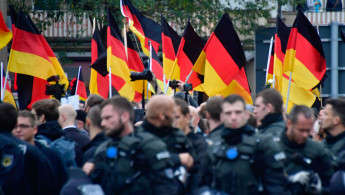German police capture ring of far-right 'terrorists' after massive operation
German police on Monday arrested six men on suspicion of belonging to a far-right terror group that attacked foreigners in the city of Chemnitz.
The German nationals, aged 20 to 31, were taken into custody for allegedly forming a group called "Revolution Chemnitz" with the aim of subverting the democratic state.
"To this end, they intended to launch violent and armed attacks against foreigners and people who have different political views," said federal prosecutors in a statement.
Their targets included representatives of different political parties as well as members of the economic establishment, the prosecutors said.
They added that the group appeared to have been planning an assault on Germany's Unity Day, which falls on Wednesday.
The arrests once again cast an uncomfortable spotlight on extremism in Chemnitz, a city in Saxony state, which is a stronghold of the far-right party AfD.
German authorities did not say whether the suspects were involved in the wave of xenophobic marches that swept Chemnitz at the end of August following a fatal stabbing, allegedly by an asylum seeker.
But prosecutors said that on 14 September five of the suspects "armed with glass bottles, weighted knuckle gloves, and an electroshock appliance, attacked and hurt several foreign residents" in Chemnitz.
Twitter Post
|
"Investigations show that the assault was a test-run for an event that one of the accused planned for October 3, 2018," said prosecutors.
Police are still investigating what exactly was being plotted for that day.
More than 100 police officers have been deployed to search apartments and other premises.
Deep resentment
Chemnitz, a city in the former East Germany, has been polarised over the question of migrants since 35-year-old carpenter Daniel Hille was stabbed to death on 26 August.
Police probing that killing have detained a Syrian man, Alaa S., 23, while an international warrant has been issued for an Iraqi man.
In the hours after the killing, thousands of people took to the streets in protest, answering calls by far-right party AfD and nationalist group PEDIGA, which campaigns against what it calls the Islamisation of the West.
Police found themselves overwhelmed by the swift mobilisation of the region's football hooligans and far-right extremists, with the demonstrations degenerating into mob violence against foreigners.
August's week of xenophobic protests in Chemnitz deeply shocked Germany.
Chancellor Angela Merkel urged Germans to stand up against the far right.
Merkel is due to visit Chemnitz in November, but she faces a cold reception. Resentment runs deep in the city over her liberal refugee policy that led to the arrival of more than a million asylum seekers since 2015.
The Chemnitz riots also threatened to break up Merkel's fragile government coalition.
Germany's spy chief Hans-Georg Maassen appeared to play down the severity of far-right mob violence.
Hardline Interior Minister Horst Seehofer of the CSU backed Maassen, while Merkel's other coalition partner the SPD wanted him removed from the job.
A compromise was finally reached to move Maassen to another post responsible for domestic security.
But the dispute left all three parties of Merkel's coalition weakened.
A survey published late September showed that the trio would not have a majority if Germany were to go to the polls.





 Follow the Middle East's top stories in English at The New Arab on Google News
Follow the Middle East's top stories in English at The New Arab on Google News
![The UAE is widely suspected of arming the RSF militia [Getty]](/sites/default/files/styles/image_330x185/public/2024-11/GettyImages-472529908.jpg?h=69f2b9d0&itok=Yauw3YTG)
![Netanyahu furiously denounced the ICC [Getty]](/sites/default/files/styles/image_330x185/public/2024-11/GettyImages-2169352575.jpg?h=199d8c1f&itok=-vRiruf5)
![Both Hamas and the Palestinian Authority welcomed the ICC arrest warrants [Getty]](/sites/default/files/styles/image_330x185/public/2024-11/GettyImages-2178351173.jpg?h=199d8c1f&itok=TV858iVg)